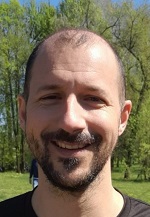Course report
Advanced Skills in Modern Radiotherapy 2022 - PDF Version
3-7 April 2022, Seville, Spain
Course director:
- Elizabeth Forde, radiation therapist, Trinity College, Dublin, Ireland
I am Valerio Pisoni, a radiation therapist (RTT) at the Azienda Socio Sanitaria Territoriale (ASST) Monza in Italy and adjunct lecturer at University of Milan Bicocca. I have been working in my department since my graduation in 2006. I would like to share with the community of the European SocieTy for Radiotherapy and Oncology (ESTRO) my experience at the ESTRO School course “Advanced Skills in Modern Radiotherapy”, which took place from 3-7 April in the beautiful Spanish city of Seville.
I decided to attend the event to expand my knowledge and skills by learning from long-time-qualified experts, and to implement these lessons in the clinical routine of my department. Moreover, I wanted to understand and compare the specific professional competencies that RTTs require to practise all over Europe, where laws, courses of study and cultures differ from country to country.
The course consisted of 23 hours of lectures, three hours of tutorials and 10 hours of practical workshops. The subjects of the workshops were:
- delineation of organs-at-risk through use of the powerful EduCase Falcon software. Use of this system enables comparison of the contours drawn by the RTT with those drawn by experts or by artificial intelligence (AI) software, and it provides metrics for the whole volumes and slice by slice;
- margin calculation for both online and offline correction strategies, and with or without intra-fraction motion management;
- image matching in cone beam computed tomography, which was shown by dedicated application specialists for both Varian and Elekta systems; and
- risk management through the use of failure modes and effects analysis to identify failures in the radiotherapy chain and to reduce the risk of their occurrence.
I found the case discussions in the lectures particularly interesting. The faculty members presented a case each for prostate, cervix, lung, breast, brain and head & neck cancers and considered them from the points of view of the RTT, the radiation oncologist and the medical physicist. This multidisciplinary approach was crucial for all the attendees to understand fully all the parts of the radiotherapy process and the different perspectives of the professional roles involved.
The course also dealt with patient preparation and positioning, pre-treatment and in-room imaging modalities, motion management, treatment planning, adaptive strategies, MRI-guided treatments and AI.
The overall experience far exceeded my expectations, and much of the credit goes to the project manager, who organised the course flawlessly, and to all the members of the faculty, who showed great competence, passion and dedication. In addition to providing us with a lot of quality content, the teachers created a friendly and relaxed environment, which helped us to follow the course with ease despite the demanding schedule. With such a positive atmosphere, it was easy to share and compare my work experiences with other colleagues, many of whom I became friends and stayed in touch in the months following the course.
I strongly encourage my RTT colleagues to attend the next editions of the course to expand their knowledge and skills in a world that is rapidly changing our professional competencies and responsibilities.

Dr. Valerio Pisoni
RTT
ASST Monza – San Gerardo Hospital
Monza, Italy
v.pisoni@asst-monza.it
valerio.pisoni@unimib.it